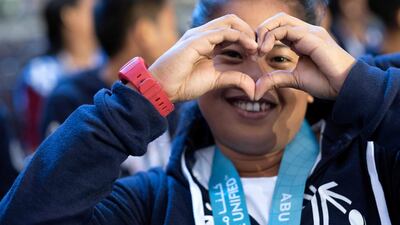With the Special Olympics World Games now over, a long-term approach to support and create opportunities for people of determination begins.
Officials and athletes’ families said the journey had only just begun with the Games throwing the door open for new initiatives that promote inclusion and a change in mindset.
Tala Al Ramahi, chief strategy officer of the Special Olympics World Games Abu Dhabi said a legacy committee was working with the Ministry of Community Development to formulate long-term policies.
"We are still at the beginning of this journey. Programmes will address the challenges that people with intellectual disabilities are still facing … there is a commitment, there is a pathway," she told The National.
More jobs, free sports training and health screenings were announced for athletes on Thursday.
This week, the Unified Champion programme, that pairs people with and without disabilities to play sports, was made mandatory at all public schools.
“We can start to get schools to test the waters and understand that inclusion is not that complicated. You just need to make sure there are different pathways available for people with different abilities,” Ms Al Ramahi said.
On Thursday, families of the athletes said they hoped such initiatives would help the last of those who viewed disabilities as embarrassing or shameful see the value in participation and inclusion.
Ayesh Al Barguthi, whose nephew Khalid won gold in the 50-metre freestyle and 25-metre backstroke, said many more families needed to be brought into the fold.
“The UAE population has a lot of people with special needs but some don’t have the courage or patience for sports.
“We need to work with these families at the grass roots, get the database and visit their houses. We need to integrate them into society.
“We must not overlook any family. Maybe they do not come out because transport is an issue or a companion is not available,” he said.
“This event has brought us global attention. But we don’t want to rest. We must see how we can make it bigger and better for our special-needs population.”
Transition plans are required for children with intellectual disabilities as they grow older, to chart their goals and match these with opportunities.
Amanda Couch, special education co-ordinator at Abu Dhabi International School said a structured strategy could prepare for the future.
“One of the biggest things we struggle with is transition planning. In the [United] States it’s mandated that when a kid hits 15 years, they must have transitional goals in their individual education plan and start working towards it.
“We don’t have that yet here. As a country, that work is starting,” she said.
“Over the last years the acceptance and overall understanding of special education has improved immensely. Obviously, children need the education but we also need to start thinking of how we make them successful after high school.”
Emirati swimmer and Special Olympics medallist Omer Al Shami is a pupil at the school and Ms Couch has watched him grow confident with sport.
The 16-year-old won gold this week in the 25 metre breaststroke, a bronze in the 4 x 50m relay and secured medals in the Mena games last year.
He is in grade 10 and has Down syndrome. His parents are already looking at options for higher education and sports that fit his ambitions of becoming a businessman and a Special Olympics champion.
Sharif Al Shami, Omer’s father, said support was needed every day.
“There is nothing to be shy of that I have a disabled person in my home. There is no disability here. We should believe in their abilities. It is not a task that can ever be finished. It is a day-to-day activity to understand them.
“The Special Olympics has been a great platform to show the world their capabilities. This is just the start.”


